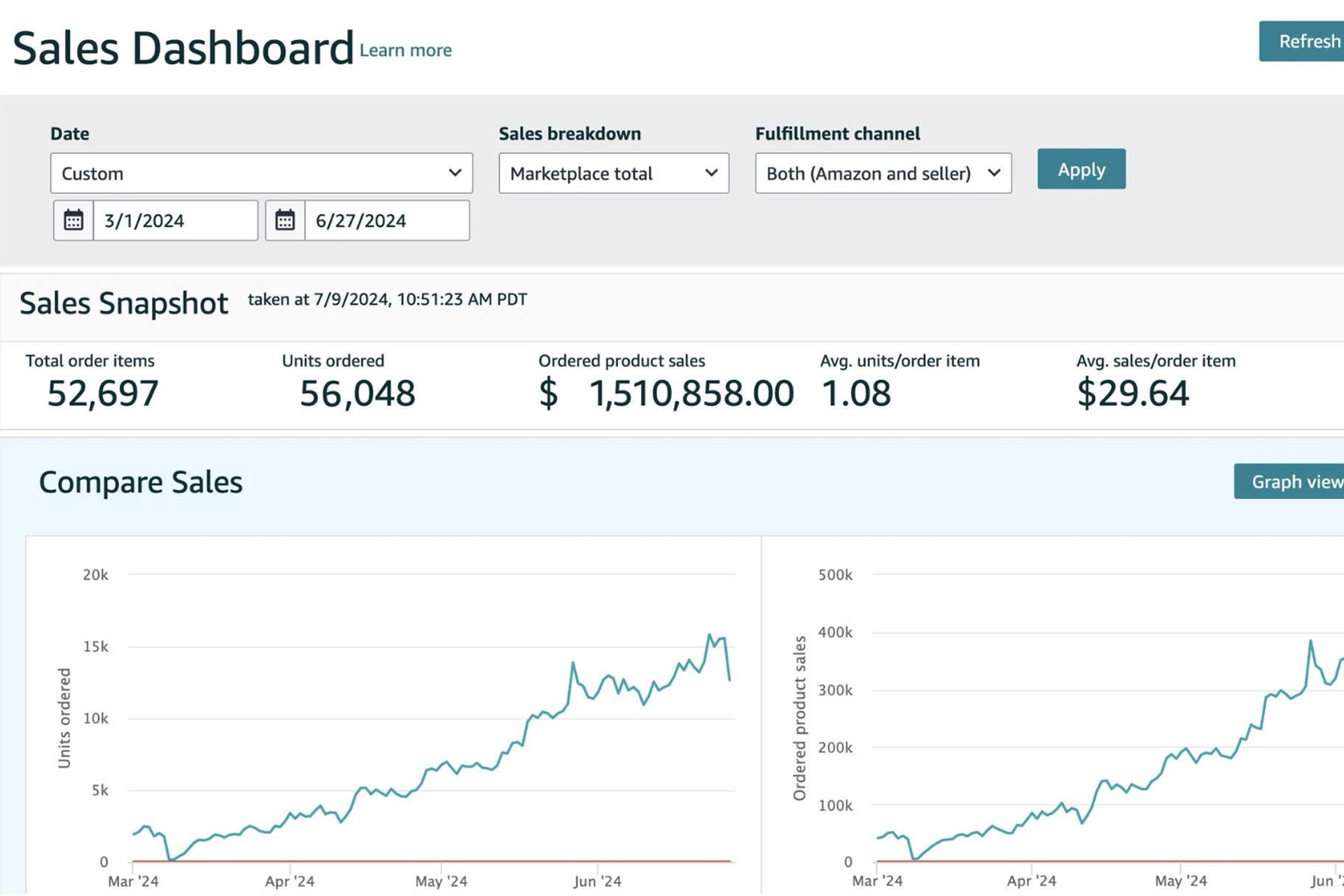Le Ngoc Tung (40, from Hanoi) made the bold decision to leave his job as a software developer earning around $600 per month to pursue a business selling T-shirts on Amazon. To his surprise, the venture now generates monthly revenues in the millions of dollars.
Working from 9 a.m. until 2 a.m. the next morning, Le Ngoc Tung devotes himself tirelessly to his laptop in a modest home office. Every day looks the same. He never meets customers in person, never handles shipping directly, and doesn’t need to rent a space to display products.
Everything he does - from product design and customer data analysis to customer service - is managed entirely on his computer through the Amazon e-commerce platform.
“The most essential factor for success in this field is perseverance,” Tung shared.
Currently, his monthly revenue on the platform ranges from $100,000 to $200,000, with most products shipped from Vietnam to the United States.
When the dream of making millions seemed like fantasy

“The key to success in this field is probably perseverance,” Tung shared. Photo: NVCC
A graduate in Information Technology from Hanoi University of Science and Technology, Tung once left his office job in Hanoi to start over in Ho Chi Minh City.
His turning point came when a friend introduced him to the concept of selling globally via Amazon. At first, he was skeptical.
“I knew nothing about Amazon apart from it being a large shopping site in the U.S. Selling products there felt like pure fantasy,” he recalled.
His first product was a T-shirt – a carefully considered choice. “Among the three basic human needs: food, clothing, and shelter, clothing is the most feasible for a small business owner like me. I couldn’t export food to the U.S., nor could I sell real estate internationally. T-shirts were manageable.”
He initially hoped to sell a few shirts each week, but during the first month, not a single order came in. His online store felt like a still lake - no visitors, no views, no engagement, and certainly no revenue.
Meanwhile, advertising costs, account fees, design expenses, and software services continued to drain his modest startup capital.
“It felt like screaming in a soundproof room where no one could hear you,” he remembered.
What troubled him most wasn’t the financial burden but the internal doubts: Had he chosen the wrong path? Could a Vietnamese really succeed in selling to the U.S. market? Were the success stories of others just exceptions?
The secret behind the massive revenue

Le Ngoc Tung's Amazon shop. Screenshot
While many new sellers were still wrestling with Excel spreadsheets, Tung had already developed his own software to manage orders, track staff performance, and automate operations from quality control and feedback tracking to real-time revenue analysis.
Moreover, he took full advantage of artificial intelligence (AI) to streamline operations. Product descriptions, SEO keyword optimization, and visual designs were all powered by AI tools, significantly cutting costs and reducing the need for hired labor while maintaining quality.
“If you just follow a preset formula, you’ll quickly fall behind,” he explained. “I set a rule for myself: test a new model every month, monitor every campaign closely, and treat customer feedback as data for improvement, not just something to read.”
He entered a market where change is constant. His strategy of continuous automation and improvement helped him stay afloat through major disruptions, from the COVID-19 pandemic to fierce competition from hundreds of thousands of other sellers.
“Most of my products originate in Vietnam, but I also manufacture certain items in the U.S. to save on shipping and avoid tax barriers. Partnering with U.S.-based factories gives me the flexibility to handle demand spikes, especially during holidays.”
After six months, the brand he built from scratch had developed a loyal customer base and maintained stable rankings in search results. Today, his monthly revenue ranges from $100,000 to $200,000.

Revenue of the shop in the first half of 2024. Photo: NVCC
However, behind those dream-like results were many sacrifices and hardships. “To get here, I had to endure at least four months without any profit - even losses. Poor ad strategies, wrong product choices, inadequate market analysis - every mistake cost real money,” Tung admitted.
He advises newcomers not to be dazzled by flashy success stories but to start small. “It’s best to work for an established e-commerce business first to learn the ropes. Once you understand operations, customers, and the platform, then think about launching your own business.”
Many people today are misled by get-rich-quick ads and unaccredited courses, some even impersonating Amazon partners to collect fees from learners.
“Amazon doesn’t solicit sellers, and there’s no such thing as paying your way to sales,” he warned. “They only support those who are serious, well-informed, and proactive.”
Currently, Tung works directly with Amazon’s official representatives in Vietnam – legitimate organizations with offices, public websites, and transparent policies for sellers.
Opening a store is free, but to succeed, sellers must make serious investments in product strategy, content creation, advertising, and customer service.
Despite everything, he still believes Amazon is a golden opportunity for Vietnamese entrepreneurs – not because it’s easy, but because it’s fair. “No one cares where you’re from, how much capital you have, or which school you went to. If you understand your customers and keep improving, you’ll have a chance. But if you fail to adapt, you’ll be out of the game faster than you think.”
Le Tung